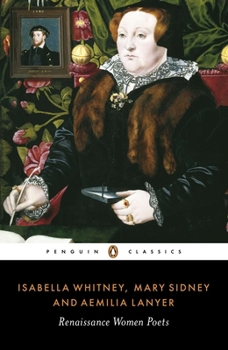Renaissance Women Poets
Select Format
Select Condition 
Book Overview
Social convention may have prevented Renaissance women writers from openly taking part in the political and religious debates of their day, but they found varied and innovative ways to intervene. Collecting the work of three great poets-Isabella Whitney, Mary Sidney, and Aemilia Lanyer-this volume repositions women writers of the Renaissance by presenting their poems in the context of their history and culture. Whitney's poems offer the only...
Format:Paperback
Language:English
ISBN:0140424091
ISBN13:9780140424096
Release Date:July 2001
Publisher:Penguin Group
Length:412 Pages
Weight:0.77 lbs.
Dimensions:0.9" x 5.0" x 7.7"
Age Range:18 years and up
Grade Range:Postsecondary and higher
Customer Reviews
1 rating
great, not perfect
Published by Thriftbooks.com User , 18 years ago
The best thing about this anthology is that it is. After decades of adding women to the Renaissance canon via one or two poems in the Norton Anthology or with tatty Xeroxed handouts, having a main-stream publisher, Penguin, devote an entire volume to these three women -- three good writers, not just anyone in a skirt who picked up a pen - is cause for celebration. I would have spent my last dime just to hold it in my hands. OK, so aside from its mere existence, what's so great about this book? Danielle Clarke and Penguin chose shrewdly with Whitney, Sidney, and Lanyer, giving us three very different women in three very different decades and three strata of English society. Whitney, writing poetry in the 1570's, uses many of the same sources and devices and the more-anthologized males of the period. Her use of Ovid is a good example. A standard assignment for Renaissance poetry is to evaluate the varied influences of Chaucer's and Boccaccio's versions of an Ovidian tale - say, Troilus and Cressida - in relation to Renaissance English translations of the Roman poet. Shakespeare is generally the target of such an assignment, but now I could make the same assignment with Whitney's poetry as the focus of the students' attention. Mary Sidney is traditionally known because of her famous brother, Philip, but her works of translation stand on their own as examples of what makes the Renaissance a re-birth - attention to English as a language worthy of transmitting great thoughts. Sidney's translation of the Psalms is colored by her Protestant Englishness, but she resists outright polemics by evincing more influence from the Geneva Bible than from the Book of Common Prayer. Her translation neutralizes the strongly male voice of David and provides a more gender-neutral text. Even more impressively, her translation of Petrarch preserves the form of terza rima, a difficult task in English. With Whitney we see the mind of the common woman, an educated subject of Queen Elizabeth, working with the fruits of the classics in the popular forms of her time. Sidney gives us translation, a hallmark of the Renaissance. Amelia Lanyer gives us insight into the realm of patronage poetry, where poets try to make a living from their verses. A standard assignment of the last decade is the comparison of her Description of Cook-ham with Jonson's Penshurst. With this anthology we have all of Lanyer's writings, so her religious poetry - particularly Eve's Apology -- can stand alone or in a study of 17th century writers such as Donne, Herrick, Herbert, and Milton. As Clarke points out in her excellent introduction, none of these women sets out to write in opposition to male poets or poetics. But surely the reader of the new millennium doesn't expect anything so reductive of women writers. This anthology provides us the opportunity to visit the minds of a cross-section of Renaissance writers: an educated commoner, a titled scholar, and a self-supporting commer







